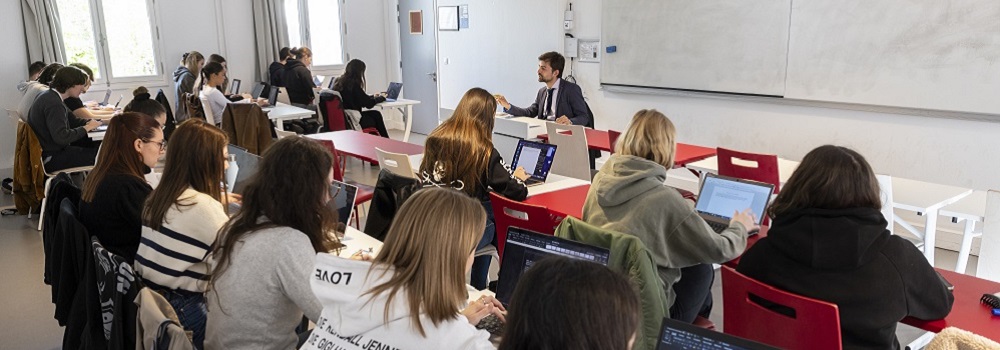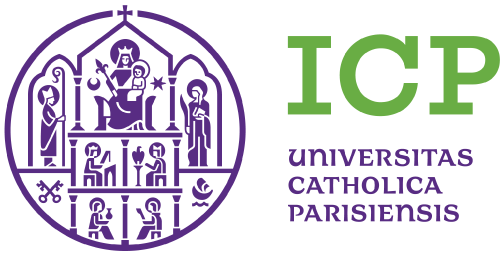- Institution
- Duration
-
1 semester
- Teaching languages
-
English

Lecture course.
The written assessment, lasting one hour, will take the form of a multiple-choice questionnaire (MCQ) covering the key concepts addressed during the course.
Regular attendance.
Books
BOUDON Julien, RIALS Stéphane, Textes constitutionnels étrangers, Paris : PUF, coll. Que sais-je ?, n° 2060, 17e ed., 2022, 128 p.
DAVID René, JAUFFRET-SPINOSI Camille, GORE Marie, Les grands systèmes de droit contemporains, Paris : Dalloz, coll. Précis, 2016, 12e ed., 539 p.
DUFFY-MEUNIER Aurélie, FASSASSI Idris, GUGLIELMI Gilles, ZOLLER Élisabeth, Introduction au droit public, Paris : Dalloz, coll. Précis, 3e ed., 2022, 300 p.
FROMONT Michel, PERROUD Thomas, Grands systèmes de droit étrangers, Paris : Dalloz, coll. Mémentos, 9e ed., 2023, 510 p.
GAMBARO Antonio, SACCO Rodolfo, VOGEL Louis, Traité de droit comparé : Le droit de l’Occident et d’ailleurs, Paris : LGDJ, coll. Traités, 2011, 480 p.
GOLTZBERG Stefan, Le droit comparé, Paris : PUF, coll. Que sais-je ?, n° 4117, 2e ed., 2024, 128 p.
HAGUENAU-MOIZARD Catherine, Introduction au droit comparé : en 10 thèmes avec exemples détaillés, Paris : Dalloz, coll. Séquences, 2018, 316 p.
HUSA Jaakko, A New Introduction to Comparative Law, Oxford: Hart Publishing, 2015, 298 p.
JACKSON Vicki C., TUSHNET Mark V., Comparative Constitutional Law, New York; St. Paul, Minn. Foundation Press, coll. University Casebook Series, 3e ed., 2014, 1908 p.
LAITHIER Yves-Marie, Droit comparé, Paris-La Défense : LGDJ, coll. Précis Domat, 2024, 642 p.
LAUVAUX Philippe, LE DIVELLEC Armel, Les grandes démocraties contemporaines, Paris : PUF, 4e ed., 2015, 1072 p.
LEGRAND Pierre, Le droit comparé, Paris : PUF, coll. Que-sais-je ?, n° 3478, 5e ed., 2016, 128 p.
RAMBAUD Thierry, Introduction au droit comparé. Les grandes traditions juridiques dans le monde, Paris : PUF, coll. Quadrige, 2e ed., 2017, 344 p.
REIMANN Mathias, ZIMMERMANN Reinhard, The Oxford Handbook of Comparative Law, Oxford University Press, coll. Oxford Handbooks, 2e ed., 2019, 1403 p.
ZOLLER Élisabeth, Le droit des États-Unis, 2014, 97 p. disponible sur le site du CDPC [en ligne] : https://centre-droit-public-compare.assas-universite.fr/fr/le-droit-des-etats-unis (Version actualisée de l’ouvrage Le droit des États-Unis, Paris : PUF, coll. Que Sais-Je ?, n° 1159, 2001).
Articles
JALUZOT Béatrice, « Méthodologie du droit comparé : bilan et prospective », Revue internationale de droit comparé, vol. 57, no 1, 2005, p. 29-48.
PICARD Etienne, « L’état du droit comparé en France, en 1999 », Revue internationale de droit ICP –Faculté de Sciences sociales d’économie et de Droit comparé, vol. 51, no 4, 1999, pp. 885-915.
PONTHOREAU Marie-Claire, « Droits étrangers et droit comparé : des champs scientifiques autonomes ? », Revue internationale de droit comparé, vol. 67, no 2, 2015, pp. 299-315.
SADURSKI Wojciech, « Constitutional Review in Europe and in the United States: Influences, Paradoxes, and Convergence », Sydney Law School Research Paper, n° 11/15, 2011, 20 p.
ZOLLER Élisabeth, « Qu'est-ce-que faire du droit constitutionnel comparé ? », Droits, n° 32, 2000, pp. 121-134
Audiovisual Materials
CRAWFORD-LACKEY Katie, VERSTEEG Mila, “Comparative Constitutional Law”, Consider the Constitution Podcast, S1E22, June 5, 2024, 21 min.
« Dynamique du droit comparé : droit civil et Common Law à l’heure de la mondialisation », Colloque organisé par la Cour de cassation le 29 novembre 2024, vidéo disponible sur YouTube [en ligne] : 1e partie : https://www.youtube.com/watch?v=S5-d6YQ6VI0 ; 2e partie :
https://www.youtube.com/watch?v=6Pdf6d_rOrk

 Libraries
Libraries
 Practical information
Practical information
